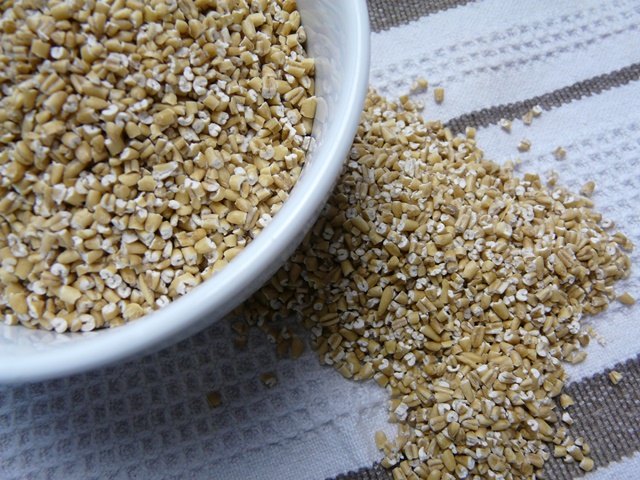- Home
- Blog
- Carbs, Sugars and Fibres
- 7 reasons whole grains are a MUST!
7 reasons whole grains are a MUST!
Written by Catherine Saxelby
on Wednesday, 16 April 2014.
Tagged: bread, breakfast cereals, carbohydrates, carbs, fibre, healthy eating, wellness, whole grains

Forget white bread and white rice. Whole grains are what we should be eating - something your grandmother would have told you! Eating whole grain foods may help with all sorts of health problems. Personally, I love whole grains as they make me feel full without over-eating which makes it easier to manage my weight without dieting. But if you want some really compelling reasons to switch, keep reading.
So what are a whole grains?
Whole grains are the big trend in nutrition at the moment but they’ve always been important for your wellbeing. You’ve probably seen them called ‘whole foods’ by the ‘natural health movement’, along with lentils, vegetables and seeds. At times they’ve been recommended for other qualities such as their high fibre or low GI contents. Whatever you call them, it’s clear that whole grains are less refined, closer to the original grain and better for you. They contain all three parts of the grain namely:
- the outer fibre-rich bran
- the nutrient-dense germ or embryo of the seed
- the inner endosperm.
By whole grains, I mean wholemeal or grainy breads, dark rye breads, whole grain crispbread, rolled oats, muesli, a huge assortment of breakfast cereals labelled with “whole grain” this or that, brown rice, bulgur cracked wheat and – gasp – popcorn.

-
Fewer heart problems
Several large studies have reported that people who eat plenty of whole grains have lower rates of heart disease and stroke. One of the earliest and best-known is a large US study called the Nurses’ Health Study that’s been underway since 1984. It was one of the first to report a link between whole grains and heart disease.
Specifically, out of over 75,000 women aged 38 to 63 years, those with the highest intake of whole grain foods were 30 per cent less likely to die of heart disease than those who ate the least. This held true even after the researchers adjusted for smoking, body weight, alcohol, vitamin E use, aspirin use and type of fat consumed.
Later studies found that whole grains can help lower blood pressure which is a huge risk factor for stroke as well as heart troubles. -
Avoid type 2 diabetes
Whole grains have been shown to stabilise blood sugar and insulin levels and so reduce the risk of type 2 diabetes. They can slow the progression from impaired glucose tolerance to full-on diabetes. -
Give your eating a nutrition boost
Whole grains are a nutritional package of goodies! Because they contain ALL the parts of the grain, including the germ and outer bran layers, whole grain foods boost your intake of a number of ‘good things’ such as:- folate, thiamin, niacin and lesser amounts of other B vitamins
- vitamin E
- minerals such as magnesium, phosphorus, potassium, etc
- trace minerals such as selenium (present in tiny or trace amounts)
- a host of phyto-chemicals (that work as antioxidants or oestrogens) like lignans, saponins and phytates.
-
Keep your digestion and bowels healthy
The insoluble fibre in whole grains helps keep things moving in the bowel — which means you avoid constipation, reduce your risk of diverticular disease, haemorrhoids, gall stones and feed the friendly bacteria that live in the large bowel. -
Reduce the likelihood of cancer
Eating whole grains can lower the risk of bowel cancer by up to 40 per cent. There’s evidence that they can also help prevent breast and prostate cancer as well. It’s early days but at least you have something positive you can do that can’t hurt and may help. -
Keep your gums healthy
Whole grains may lower the likelihood of periodontitis – inflammation of the gums that can cause wobbly teeth and even lead to lost teeth.
Researchers from McMaster University in Canada tracked the health of more than 34,000 men aged from 40 to 75 years over a 14-year period. During this time, almost 1900 men were diagnosed with periodontitis.
Those who reported eating the most brown rice, dense grain breads, oats, whole wheat cereals and other whole grains (about three servings a day) were 23 per cent less likely to develop periodontitis than those who ate less than one serving of whole grains a day. -
Easier to manage your weight
This is a no-brainer! Whole grains take a lot more chewing than the soft white stuff so you take longer to munch your way through them which gives your stomach time to signal the brain that it’s full. Plus they fill you up so you’re less inclined to pick between meals. That grainy sandwich you had a lunch can take you to dinner!
Studies back this up. For example, in one US study of over 74,000 middle-aged nurses, the women who consumed more whole grains consistently weighed less than the women who consumed more refined versions of breads and cereals.
The bottom line
Eating more whole grains is a must. Here I give you 7 reasons why you should.
You may also be interested in...
References / External articles
Foodwatch
The Good Stuff
The Boring Stuff
© 2025 Foodwatch Australia. All rights reserved
Website by Joomstore eCommerce





